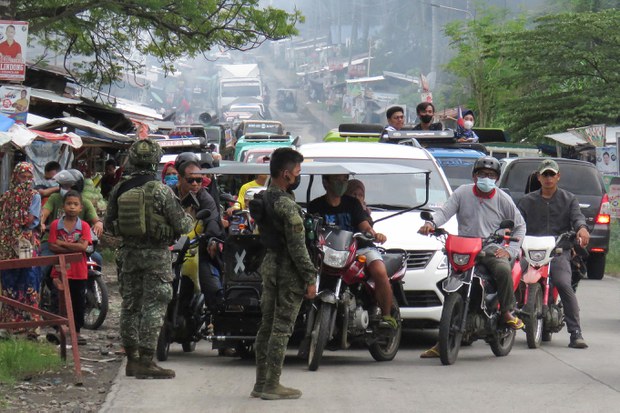Philippines Disbands 20 Private Armed Groups Ahead of May 9 General Election
at the date of
Thursday, April 28, 2022
Edit
 |
| Philippines disbands some private armed groups ahead of May 9 election Philippine soldiers man a checkpoint in Lanao del Sur province ahead of the May 9 General Election, April 25, 2022 - (AFP) |
MANILA, LELEMUKU.COM - Authorities in the Philippines have disbanded about 20 private armed groups working for politicians over concerns about potential poll-related violence ahead of the May 9 general election, the national police said Tuesday.
Meanwhile, the election commission announced it was taking control in another eight municipalities to directly supervise polling officials and oversee security for the upcoming vote.
Most of the disbanded armed groups were from an autonomous Muslim region in the south, where some members of gun-for-hire organizations are known to have links to militants, police spokeswoman Col. Jean Fajardo told a Manila radio station.
“More or less, we have dismantled about 20 from our list of private armed groups,” Fajardo said, emphasizing that some of the armed men “are members of local terrorist groups who hire themselves out during elections to politicians.”
Police and the military had carried out focused operations since the start of the year, she said, adding that politicians known to have employed these gunmen would be charged in court.
“At the moment, we have not monitored any credible threats, so to speak, that could disrupt the election,” she said. “Nonetheless, we will not let our guard down, and intelligence monitoring and gathering are being carried out with our AFP [military] counterparts and other law enforcement agencies.”
Last year, police had identified about 155 private armed groups across the Philippines, half of which, officials said, were highly active.
The constitution stipulates that private armies and other groups not recognized by the government shall be dismantled.
Comelec action
Also on Tuesday, the Commission on Elections (Comelec) announced that it was placing under its control another six municipalities in Maguindanao province, along with a city and municipality in Lanao del Sur province, according to the state-run Philippine News Agency (PNA).
Comelec has assumed direct control of electoral supervision and law enforcement agencies for the safeguarding and integrity of polls in at least 20 municipalities, mostly in the south and the Bangsamoro Autonomous Region in Muslim Mindanao in the run-up to the vote, according to officials. The national polls body took similar action in municipalities ahead of the 2016 general election.
“As regards to other areas, we are continuously upgrading and updating our assessment status,” said Saidamen Pangarungan, the chairman of Comelec, according to PNA.
Under an updated resolution adopted in January, Comelec may place any political division under its direct control and supervision. Leading up to the election, “it shall exercise full control and supervision over all national and local law enforcement agencies as well as military officers and men assigned in the political division, subdivision, unit or area concerned.”
The resolution, among other things, allows Comelec to take action in communities: That have a history of or current intense rivalries that could motivate people to engage in violent acts; That have had incidences of politically motivated violence involving candidates and/or supporters; And that could have violence “facilitated by the employment of private armed groups.”
The Philippines, with its long-running gun culture, coupled with feuding clans in tribal areas as well as rival political dynasties trying to outdo each other, has seen gun-for-hire groups commit violence in advance of elections.
During the 2016 general election, as many as 50 people died in poll-related violence, according to police statistics. Three years later, during the 2019 midterm election, 23 people were killed and 50 injured.
The bloodiest election-related violence occurred in November 2009 when members of the Muslim Ampatuan clan massacred 58 members of their rival clan, the Mangudadatu, their supporters and local journalists.
In December 2019, dozens of Ampatuan clan-members were convicted of murder, but more than 50 others – including dozens of police officers and body guards in the employ of the Ampatuans – were acquitted.
Some relatives and members of the Ampatuan clan are back in power and will be contesting local posts in Mindanao next month.
Duterte: ‘I will arrest you and your body guards’
About 65 million Filipinos are registered to vote on May 9 to elect President Rodrigo Duterte’s successor along with 12 members of the Senate, 316 members of the House of Representatives as well as thousands of officials including governors, mayors, village chiefs and council members.
Last week, Duterte warned candidates to follow election laws, saying that maintaining more than two bodyguards constitutes maintaining a private army.
“We have decided and have communicated this with the cabinet. ... The rule should really be followed… that more than two bodyguards would be considered a private army,” Duterte said.
“And if you think there is danger to your person and a certain place or person, call the regional director, call the chief of police and discuss matters to prevent quarrels and the use of guns,” he said.
Duterte vowed to let authorities arrest those candidates who would stoke violence during the remainder of the election season.
“I will arrest you and your bodyguards. Remember, the government will not allow terrorism in this election. We are not taking sides. We will enforce the law to make the elections peaceful,” he said. (Jeoffrey Maitem/ Froilan Gallardo| BenarNews)
